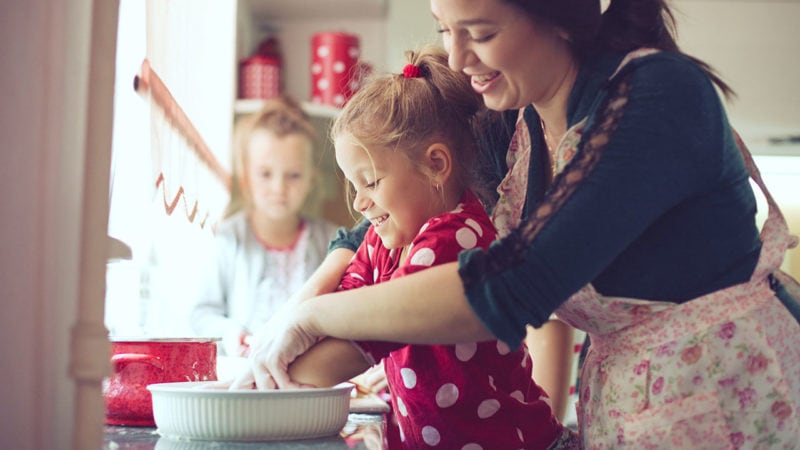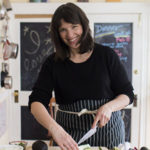Last Updated on January 27, 2025
I have to tell you: I’ve never been big on sharing the kitchen with my kids.
I’m a writer with a couple of cookbooks and many recipes to my name, someone who cooks dinner most nights and who is happiest puttering in a (clean, quiet) kitchen, not gritting my teeth while my kids repeatedly swipe their dirty fingers through the bowl of cookie dough.
So while I want food to matter to my kids the way it does to me, I haven’t always been able to muster the patience or thickness of skin it takes to invite them into the kitchen and cook alongside me. Until recently.
As the time when we’re all home together stretches on, I also have to tell you: I’m someone who loves cooking and is very tired of cooking. This fatigue is a big part of what’s helping me to come around to cooking and baking with my two school-aged boys.
Sharing the kitchen with the kids is as much about experimenting to find activities we can do together as it is teaching them some self-reliance. Cooking with children—teaching them basic skills, then stepping back and letting them experiment, fail, and try again—has many benefits. Not least of which is that sooner than later, they’ll be able to feed themselves—and maybe even you.
Of course, cooking for my boys is also one way I express love and care for them, so I’m sure my days of griddling grilled cheese sandwiches and cutting up carrot sticks are far from over, and that’s okay with me.
But here are a few of the things I’ve noticed since they’ve been given some casual lessons and some freedom in the kitchen.
Cooking helps develop executive function
If you’re a kitchen control freak like me, there’s no way you’re gonna let your kids dive into a recipe without reading through it first, gathering the ingredients, and getting the prep done before they start whisking and folding. Not to mention cleaning up afterward (yeah, we’re still working on that one).
Learning to read and follow the steps of a recipe is an exercise in organization, and when you’re first learning to cook, it’s essential.
It is my great hope that these skills transfer to, say, completing a book report or pulling off a long-term history project.
Baking is a science lesson in disguise
I’m always tickled by how fun and easy it is to engage the kids on how yeast works or why you need an acidic ingredient to activate baking soda. For them, it’s just pancakes. But for me, it’s a way to show them how science isn’t just an experiment in a classroom, it’s all around us, all the time.
Experimentation encourages problem-solving: During one recent afternoon baking session, my son insisted on making chocolate cake without a recipe and without my help. I took a deep breath and backed off.
The resulting “cake” was barely edible, and he gave me the green light to toss it the next day. From then on, he’s focused on what went wrong, and taken my advice regarding the usefulness of recipes.
Cooking helps kids figure out what they like to eat
I have one picky eater in the household – paradoxically, he’s the one more interested in cooking. One of the most rewarding aspects of this time in the kitchen is watching his curiosity and initiative unfold. If he knows there are ingredients he can put together into something to eat, he has the budding confidence to go for it.
I hope he’ll soon figure out how to do this for more than sausage and bacon, waffles and cake. But in the meantime, I’m just glad I don’t have to make the waffles anymore.
This is the first in a short series of posts about teaching kids to cook. Check back next week for some ideas on how to get kids started on basic skills and tasks in the kitchen.
Leigh Belanger is a writer, editor, and culinary expert with a passion for food, storytelling, and sustainability. As an Editorial Director for ButcherBox, she has crafted engaging content that highlights high-quality ingredients, delicious recipes, and the joy of home cooking. Through her work, Leigh inspires people to cook thoughtfully and creatively.



